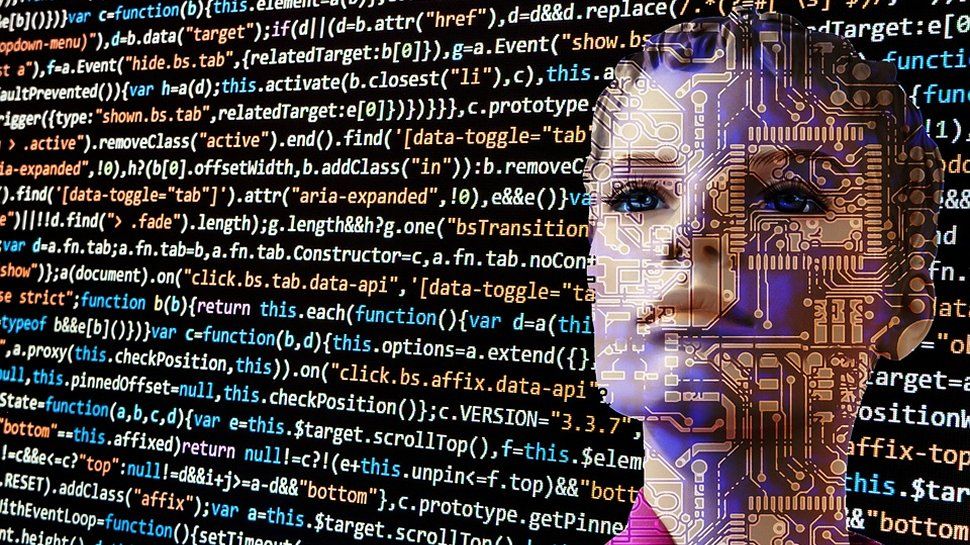Conservatives in California descended on Orange County over the weekend for the Republican Party’s Fall 2025 Convention and Leadership Summit. Some of the sessions at the three-day event focused on artificial intelligence, providing a peek at how the party of Donald Trump plans to use AI in the 2026 midterm elections and beyond.
Brent Lowder, the California director of a right-wing nonprofit called the Leadership Institute, gave well-attended talks at the convention about how Republicans should use AI in a rapidly evolving environment. Lowder’s talks emphasized the need for conservatives to embrace new technology as quickly as possible or risk getting walloped by Democratic opponents who use AI.
“AI’s just this kind of new technology, and I don’t wanna see conservatives be slow to adopt it, like we’ve done so much before. That’s why it’s so important for us,” Lowder told the audience.
In 2008, presidential hopeful Barack Obama promised to announce his VP candidate (Joe Biden) via text, which allowed his campaign to collect a massive number of phone numbers from people who wanted to be the first to know. And in 2012, President Obama’s campaign embraced social media in ways that his competitor, Mitt Romney, did not.
The 51-year-old Lowder, who previously ran a political action committee that helped elect Trump to his first term in 2016, understands Republicans can’t get caught flat-footed technologically.
That kind of fear about missing out seemed to drive much of the discussion. But Lowder also touted the increased efficiency he saw in using AI. Lowder told the audience to think of AI as “super interns.” He said that AI makes mistakes, and it’s important not to just use whatever the AI produces as a final product. And he repeatedly reminded the audience that AI will just make things up and produce errors. It was a tool, he told the crowds. And it was interesting to hear him downplay the capabilities while remaining optimistic, a contrast to the hype of AI CEOs who insist tools like ChatGPT are like having PhD experts in any field.
Lowder also stressed that you could really get some interesting ideas by prompting tools like ChatGPT to pretend as though it were a conservative operative, using that exact kind of wording when asking for an analysis of poll results.
 Brent Lowder gives a presentation at the California Republican Party Convention and Leadership Summit in Garden Grove, California, on Sept. 6, 2025. © Photo: Matt Novak / Gizmodo
Brent Lowder gives a presentation at the California Republican Party Convention and Leadership Summit in Garden Grove, California, on Sept. 6, 2025. © Photo: Matt Novak / GizmodoLowder played videos of Steve Jobs giving a speech at Leeds University in 1985 that seem incredibly prescient 40 years later. Jobs predicted that one day, people might be able to have a conversation with Aristotle. The audience was audibly impressed by the late Apple co-founder’s predictions, instantly making the connection to tools like OpenAI’s ChatGPT.
Lowder told the audience about different kinds of AI tools they could use beyond ChatGPT, including Grok, which he noted was run by Elon Musk, “so it’s a little bit crazy and wild-eyed, and also a lot of fun.” He told the audience that his favorite tools were Perplexity, because of how it cited sources, and NotebookLM, because of the customization options.
He also recommended that anyone who needed to use sensitive documents download something like Jan.ai to run a model locally. Privacy can obviously be a major concern for political campaigns, and even the most green convention attendees seemed to understand that.
One man from the audience asked if he could ask ChatGPT about any secret information that may have been uploaded by Democrats. Lowder told him that wasn’t going to work, but noted that Republicans shouldn’t upload anything sensitive.
Lowder said that AI could make people nervous because they consider it creepy, especially given how it’s now being portrayed in popular media. And while he understood where that unease was coming from, it was vital for the conservative movement to embrace it if they wanted to win elections.
Lowder had AI write some social media posts, generating bullet points about innovation and the free market. One of the examples that came back was, “Let’s keep those incentives flowing to watch innovation as it transforms our world.” Lowder then showed how he asked the bot to punch up the language to make it “shorter” and more “edgy” but it spit out something that was too over the top: “We’re here to dominate, innovate, and conquer in the free market. In the free market jungle.”
“So I was like, ‘Eh, I don’t know if I want my candidate to say we’re here to dominate that.’ You know, Trump can say that, but maybe not everybody, right?” Lowder said, to a laugh from the audience.
Even though Lowder is clearly all-in on Trump and Trumpism, it was interesting to hear him talk in what might be considered more old-school Republican language. When Lowder was asked about the biases that may be present in the major AI chatbots, he talked about the notorious example when Google’s Gemini generated images of American founding fathers as Black in early 2024. But Lowder was quick to note that all of the big tech companies just want to make a product that works as they seek to dominate the space.
The problem with so many AI chatbots, as Lowder sees it, is that they’re trained on the internet, which apparently has a liberal bias. “I would guess it probably leans left. The reality is all these models were trained basically on the internet, right? And the internet leans left,” Lowder said. But he insisted that the free market would sort it all out. That’s not quite how Trump sees the world these days, as he gobbles up 10% of Intel.
Lowder also showed off how AI image tools could be used to clean up campaign photographs, using a failed local politician, former Republican Rep. Michelle Steel, as an example in his slides. Lowder said that if you took a photo for a campaign and wanted to remove a tattoo, that was something AI could help you with, showing the audience before and after photos of the “unwanted tattoo.”
 Session from a panel on AI at the California Republican Party Convention and Leadership Summit in Garden Grove, California, on Sept. 6, 2025 showing Rep. Michelle Steel (center) in a campaign photo. © Photo: Matt Novak / Gizmodo
Session from a panel on AI at the California Republican Party Convention and Leadership Summit in Garden Grove, California, on Sept. 6, 2025 showing Rep. Michelle Steel (center) in a campaign photo. © Photo: Matt Novak / GizmodoDuring the 2024 race, Steel lost to her opponent, Democrat Derek Tran, by an extremely close margin in Orange County. How close? Just 653 votes. Steel had compared Tran to Mao Zedong and used hammer and sickle imagery in mailers. Tran is the son of Vietnamese refugees who fled the Communist country, making her attack particularly weird. But it’s unclear if she actually used AI to remove any tattoos from her own campaign mailers. That may have just been a hypothetical on Lowder’s part, who insisted he didn’t actually have anything against tattoos.
Lowder came across as knowledgeable and reasonable when it came to the possibilities and limits of AI, but he did show the limits of his knowledge at times, including when he suggested that he could tell when something was written by AI just because it used an em dash. Or, as he called it, a long hyphen.
“We all laugh at each other when we can see somebody send us an email or a leftist candidate puts a quote in that we can tell is generated by GPT,” Lowder told the audience. “You know how you can tell it’s GPT? GPT loves really big hyphens. So if you see really big hyphens, and they use them a lot, it’s definitely a GPT thing, I guarantee you.”
Again, they’re called em dashes. And the reason that AI chatbots like to use em dashes is because 30- and 40-somethings love to use em dashes. People jokingly refer to them on social media as “millennial em dashes” for a reason. In fact, President Donald Trump sometimes uses em dashes in his Truth Social posts. But that’s not because Trump is using AI. It’s almost certainly because Trump often dictates his posts to a person, and during the 2024 presidential campaign, that person was Natalie Harp, his 34-year-old assistant. Is it possible that Trump uses AI? Sure. But the more likely explanation is that his millennial assistant is just showing her love for millennial em dashes.
Lowder clearly believes that AI is a powerful tool. And any Republican who resists embracing platforms like Perplexity, ChatGPT, and NotebookLM is bound to be left in the dust.
“The bottom line is we have to get over that nervousness and we have to engage with the technology because if we don’t, there’s gonna be consequences, right?” Lowder said. “It’s not going anywhere.”
And however you feel about AI personally, Lowder’s perspective is one shared by just about every political operative across the spectrum right now. You may like AI, you may hate it. But even if the AI bubble were to burst tomorrow, it really feels like a technology that will be around in some form for many years to come. The question is just how Lowder and his opponents decide to get with it.









 English (US) ·
English (US) ·